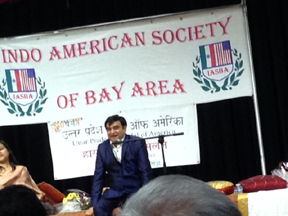 SUNNYVALE: The audience at the event hall in the Sunnyvale Hindu temple last week was experiencing waves of laughter, fully immersed in the Hasya Kavi Sammelan taking place there. With poets, singers, and storytellers, experienced in wordsmithing, gracing the occasion, it was no wonder that the light hearted mood was palpable. This event was presented as collaboration between the Indo American Society of Bay Area and the Uttar Pradesh Mandal of America (UPMA). A delegate from the UP government was also present as part of an effort to reconnect people of UP origin to their roots.
SUNNYVALE: The audience at the event hall in the Sunnyvale Hindu temple last week was experiencing waves of laughter, fully immersed in the Hasya Kavi Sammelan taking place there. With poets, singers, and storytellers, experienced in wordsmithing, gracing the occasion, it was no wonder that the light hearted mood was palpable. This event was presented as collaboration between the Indo American Society of Bay Area and the Uttar Pradesh Mandal of America (UPMA). A delegate from the UP government was also present as part of an effort to reconnect people of UP origin to their roots.
The lively evening began with an introduction by Archana Panda, the MC and one of the organizers, who also elicited audience participation. She began the session with her poetry woven into songs based on love in all its aspects…spiritual, physical, emotional, and devotional.
Henceforth, each member of the visiting delegation took turns at the podium to connect with the audience, be it with their emotive poetry and singing, or pot shots at politicians, or a string of jokes reminding us of WhatsApp exchanges!
Arun Gemini from Haryana, India, in his deadpan delivery requested the audience to put their cell phones on Manmohan Singh mode (silent), and their hands in Narendra Modi mode (action), thus adequately setting the expectation of a fun-filled evening.
Arunji even made fun of being from Haryana, as the birthplace of Kavi sammelan, since the epic poem, Gita in Mahabharat was sung there by Lord Krishna, and Arjun, who decided to enter battle rather than endure more of it. Arunji went on to entertain with clever juxtaposition of words, and finding humor in India’s defeat at the Olympics, because, even though they were bodily defeated, they remained winners spiritually. He included pithy comments and suave leg pulling of the politicians, business community and the legal system, all fair game for such creativity.
Ved Prakash Ved from Delhi brought in the hasya ras using the infamous relationships between mothers and daughters-in law, dating back to the times of Sita in Ramayan, when she willingly went for Banwas, rather than put up with three mothers in law at home.
He explored the problem of adulteration in India, where a gamut of things are spurious, from food additives, atmospheric pollution to illegitimate children!
There was dark humor disguising the message that we should indeed be fearful of food that threatens to consume us, rather than the other way around. Vedji took on allegations against baby Krishna by the gopis and his mother Yashoda as having stolen the churned butter.
However, Lord Krishna could dispute that through a health report which did not detect any spurious additives in it, thereby declaring Krishna innocent. In his lighter selections, he introduced a piece on Mallika Sherawat, a top Bollywood dancer, who reaches heaven and wreaks havoc on the citizens.
Ritu Goyal, from Delhi also sang her own compositions on relationships. Her song about women in love was alive with imagery, as was the one about fathers and their sentiments, and the many roles they play in a family indeed brought out a few tissues to the eyes to wipe away a stray tear in the audience.
Her nuanced portrayal of a wife’s sentiments and the sacrifices she makes to adjust to her busy husband who has no time for his wife, saw many audience members nodding their heads in agreement as a mute testimony to the marriage between man and his gadgetry. Rituji delivered more such songs and prem ras about gender roles and gender differences.
Both Arunji and Rituji commented on a teacher’s positive role in young lives and created poems about the languages we speak. In the case of Rituji, she saluted the Hindi language and paid homage to the richness it brings, while Arunji made fun of the “foreign” language, English.
All in all, there were deep, dark issues presented through the medium of song and poetry, belying their seriousness; as well as pure hasya ras and vyang (wit and satire), which brought mirthful laughter at the genuine and unpretentious nature of the emotions they elicit.
Archana Asthana






